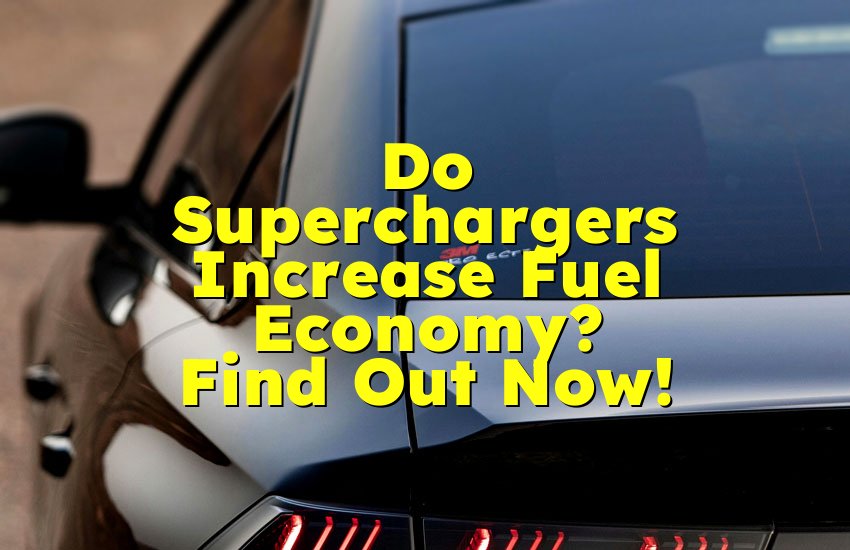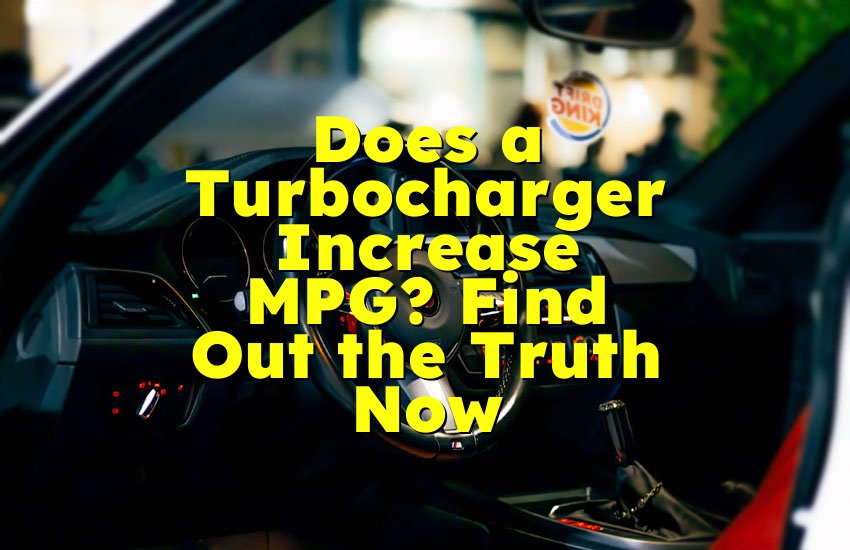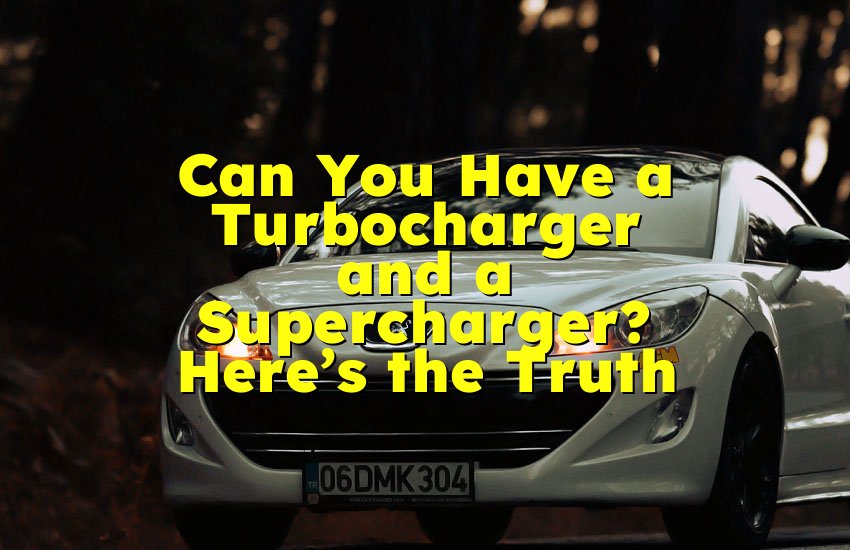As an Amazon Associate, I earn from qualifying purchases at no extra cost to you.
Do Superchargers Increase Fuel Economy? Find Out Now!
Superchargers are often linked with faster cars and more power. But many people ask, do superchargers increase fuel economy? The quick answer is no. Superchargers push more air into the engine, which makes it burn more fuel.
In this article, we will explain everything in a very simple way. You will learn how superchargers work, when they affect fuel, and how you can manage your car efficiently. By the end, you will know the truth and what to expect for your car's fuel use.
How Superchargers Work and Affect Engines
Superchargers are machines that force air into your engine. More air means the engine can burn more fuel at once. This gives your car more power and faster acceleration. However, because the engine uses more fuel, it usually lowers fuel efficiency. Most people enjoy the speed but notice their gas tank empties faster.
A supercharger sits on top of the engine. It connects to the crankshaft or uses a belt to spin. When you press the gas pedal, it pushes more air into the cylinders. Then, the engine mixes fuel with this air and burns it quickly. This gives instant power, especially at high speeds.
Some engines are designed for superchargers. They can handle the extra pressure and heat. But even then, the fuel economy usually drops compared to normal engines. Superchargers are about power first, not saving fuel. Drivers can sometimes tune the car to reduce fuel loss, but it is never fully as efficient as a naturally aspirated engine.
The type of supercharger also matters. Roots-style superchargers give a strong boost at low speeds, but burn more fuel. Twin-screw superchargers are more efficient but still use extra gas. Centrifugal superchargers are closest to being fuel-friendly, but they still increase consumption under load.
- Superchargers push more air into the engine.
- More air makes the engine burn more fuel.
- Different supercharger types affect fuel use differently.
- Power goes up, fuel efficiency usually goes down.
Comparing Fuel Economy: Supercharged vs Naturally Aspirated Engines
When you compare cars with superchargers to normal engines, you will see a clear difference. A naturally aspirated engine uses only the air it pulls in naturally. This keeps fuel use more consistent. Supercharged engines push extra air, burning more gas per mile.
For example, a small car with a supercharger might drop from 30 MPG to 22 MPG. That is a big difference if you drive long distances. Some sports cars accept this trade-off because drivers want speed more than fuel savings. However, for daily commuting, this can be costly.
Driving style also matters. Aggressive acceleration with a supercharged car uses much more fuel. Light driving can help save some gas, but the engine still burns more than normal. Over time, fuel costs add up. Car owners must understand that superchargers are not meant for efficiency.
Engine tuning and modern technology can reduce the fuel penalty. Some supercharged engines have advanced sensors that adjust fuel delivery. This helps the engine run smoother and slightly better on fuel. But even with these features, the extra fuel use is always there when the supercharger is active.
- Supercharged engines use more gas than naturally aspirated engines.
- Driving style affects fuel economy strongly.
- Advanced tuning can reduce, but not remove, extra fuel use.
- Superchargers are more about performance than efficiency.

Situations Where a Supercharger Could Save Fuel
It may sound strange, but in some cases, a supercharger can indirectly help fuel use. If a small engine is struggling without a supercharger, adding one can let it run at lower RPMs on highways. Lower RPMs sometimes mean slightly better fuel economy.
Another situation is downsizing. Some modern cars use smaller engines with superchargers. The engine produces power like a bigger engine but stays smaller, so it may use less fuel at normal speeds. This is not the same as increasing fuel economy, but it can make overall efficiency better compared to using a bigger engine without a supercharger.
Also, hybrid systems combined with superchargers may allow the engine to stay in a more efficient range. The electric motor can handle low-speed work while the supercharger only adds power when needed. This helps save fuel compared to a full-power supercharged engine all the time.
Still, these cases are rare. Most drivers will see superchargers reduce their miles per gallon. The real benefit is always power, torque, and performance. Fuel economy improvements happen only in special designs or careful driving.
- Small engines with superchargers may run efficiently at steady speeds.
- Downsized engines with superchargers can match larger engines’ power.
- Hybrid systems can balance power and fuel use.
- Overall, fuel savings are limited and situational.
Maintenance and Driving Tips to Manage Fuel Use
Even though superchargers use more fuel, proper maintenance can help. Clean air filters allow better airflow, which helps the engine burn fuel efficiently. Old spark plugs or dirty fuel injectors make fuel use worse, so replace them regularly.
Driving habits matter a lot. Avoid heavy acceleration unless necessary. Use cruise control on highways to keep speed steady. This reduces extra fuel consumption caused by the supercharger working too hard. Smooth braking and gear changes also save gas.
Another tip is to monitor tire pressure. Low tires increase engine work and fuel use. Regular oil changes keep the engine running efficiently. Some drivers even upgrade to lightweight parts to reduce engine load, which indirectly helps fuel economy.
In short, a supercharger always uses more fuel when fully active. But careful maintenance and smart driving can minimize the extra consumption. You cannot make it equal to a normal engine, but you can reduce the waste and save money over time.
- Keep air filters and spark plugs clean.
- Drive smoothly, avoid hard acceleration.
- Use cruise control for steady speeds.
- Regular maintenance helps reduce fuel waste.
Myths About Superchargers and Fuel Economy
There are many myths online about superchargers increasing fuel economy. Some people think boosting air into the engine makes it more efficient. The truth is, more air means more fuel burned. You get more power, but fuel economy drops.
Another myth is that superchargers only work when the car is fast. Actually, they can operate anytime the engine demands power. Even small bursts of supercharger use increase fuel consumption. Modern engines try to limit this, but physics cannot be ignored.
Some claim that switching to premium fuel helps fuel economy with a supercharger. Premium fuel can improve performance slightly, but it does not increase miles per gallon. The engine still burns more fuel under load. People may feel smoother acceleration, but efficiency is not improved significantly.
Finally, some believe tuning the supercharger can make the car save gas. While tuning can improve throttle response and smoothness, it cannot make a supercharger give better fuel economy than a naturally aspirated engine. Power and efficiency always trade off.
- Superchargers do not improve fuel economy.
- Using them increases fuel use instantly.
- Premium fuel improves performance, not MPG.
- Tuning helps power, not fuel savings.
Alternatives to Improve Fuel Economy Without Losing Power
If you want more power but also good fuel economy, there are alternatives to superchargers. Turbochargers are one option. They use exhaust gases to increase air pressure instead of the engine’s power. This can be more efficient than a supercharger.
Another alternative is hybrid or electric systems. Electric motors give instant torque without burning fuel. Combining a small engine with an electric motor can provide power when needed and save fuel most of the time.
Engine tuning and lightweight modifications also help. Reducing weight, improving aerodynamics, and using efficient tires can give better fuel economy. These changes do not compromise power as much as a supercharger does.
Finally, smart driving habits remain key. Gentle acceleration, maintaining highway speeds, and avoiding unnecessary idling all increase fuel economy. These methods may not give extreme speed, but they balance performance and efficiency well.
- Turbochargers can provide power more efficiently.
- Hybrid or electric motors save fuel while adding torque.
- Lightweight and aerodynamic improvements help efficiency.
- Smart driving habits always boost fuel economy.
Final Thoughts
Superchargers make your car fast, but they do not improve fuel economy. They always use more fuel because they force the engine to burn extra gas. Proper maintenance and careful driving can help, but you cannot fully match a normal engine. Understanding this helps you plan fuel costs and enjoy power responsibly. Choosing the right alternatives or combining technology can balance speed and fuel use.
| Topic | Key Points |
|---|---|
| How Superchargers Work | Push more air, increase power, reduce fuel efficiency |
| Supercharged vs Normal Engines | Supercharged engines burn more fuel, driving style matters |
| Situational Fuel Savings | Small engines, downsizing, hybrids may save some fuel |
| Maintenance Tips | Clean filters, smooth driving, regular checks reduce waste |
| Myths | Superchargers do not increase MPG, premium fuel helps power not fuel |
| Alternatives | Turbo, hybrid, light weight, smart driving improve efficiency |
Frequently Asked Questions (FAQs)
Is it true that superchargers always lower fuel economy?
Yes, superchargers generally lower fuel economy. They push more air into the engine, which forces it to burn more fuel. This extra consumption happens even with careful driving. Some engines are designed to reduce the penalty slightly, but they never match a naturally aspirated engine. The main goal of a supercharger is power, not saving gas. Drivers can manage fuel with smooth driving, but it still uses more fuel overall.
Can I use a supercharger and still save fuel?
You can reduce fuel waste, but a supercharger cannot truly save fuel. Using it gently and driving at steady speeds lowers consumption slightly. Maintenance like clean air filters and spark plugs also helps. Some modern cars with small engines and superchargers use less fuel than bigger engines, but only under light driving. The supercharger always burns more fuel under load, so “saving fuel” is only partial, not full.
Do I need premium fuel for supercharged cars?
Premium fuel is not required for all supercharged cars, but it can help performance. It allows the engine to handle higher pressures and heat more safely. However, premium fuel does not improve fuel economy much. It makes acceleration smoother and protects the engine, but miles per gallon stay lower than naturally aspirated engines. Fuel efficiency depends on driving habits more than the fuel type.
Is it better to get a turbo instead of a supercharger for fuel economy?
Yes, turbochargers are often better for fuel economy. They use exhaust gases to create boost, which is more efficient than engine-driven superchargers. A turbo can give extra power only when needed, helping normal driving use less fuel. However, turbos have their own maintenance needs, and aggressive driving still increases consumption. For balancing power and fuel economy, turbos are usually a smarter choice.
Can hybrid cars use superchargers efficiently?
Hybrid cars can use superchargers more efficiently than regular cars. The electric motor provides torque at low speeds, so the engine can stay at efficient RPMs. The supercharger adds power only when needed, reducing overall fuel use compared to a full-power supercharged car. Still, hybrids with superchargers are not as fuel-efficient as fully electric cars. The system balances power and fuel better but does not eliminate extra consumption.
Do I lose engine life with a supercharger?
Superchargers put more stress on engines, but proper maintenance keeps them safe. Regular oil changes, spark plug checks, and cooling system care are very important. Engines built for superchargers can last long if maintained well. Neglecting maintenance increases wear and tear and can shorten engine life. So, careful care is essential for longevity.
Is it worth adding a supercharger for daily driving?
For daily driving, adding a supercharger is usually not worth it for fuel economy. You gain power but lose efficiency, which increases fuel costs. If you want speed and enjoy performance, it can be fun. However, for commuting or long trips, the extra fuel use often outweighs the benefit. Alternatives like a turbo or hybrid setup may be smarter for daily use.
Can I tune my supercharger to save fuel?
Tuning a supercharger can improve smoothness and throttle response, but it cannot fully save fuel. Even tuned superchargers still burn more gas under load. Careful driving combined with tuning can slightly reduce waste, but the engine's basic physics require extra fuel to make extra power. So, tuning helps performance but not overall efficiency.











